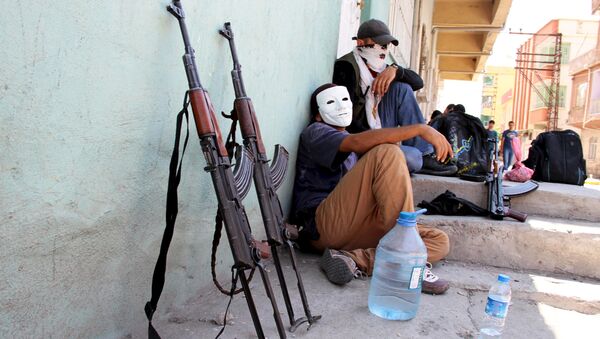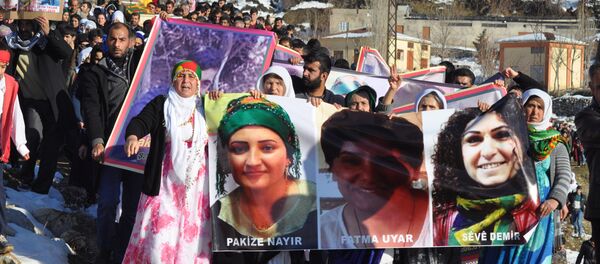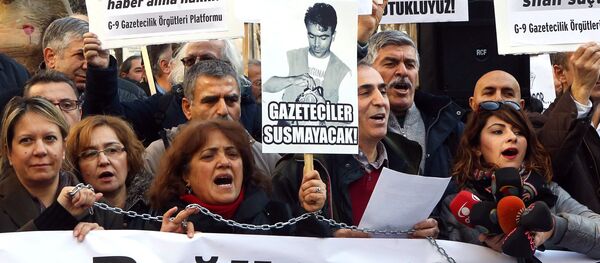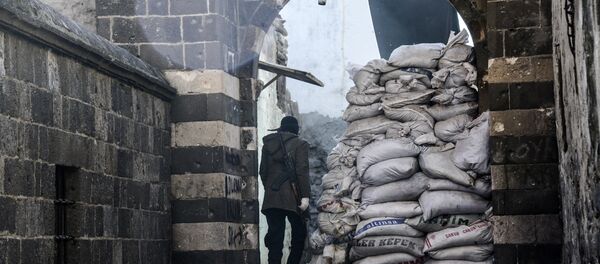In an fiery op-ed for the Islamist Turkish newspaper Milli Gazete, Ozkan emphasizes that it's not just Russia attempting to destabilize Turkey through support for the 'terrorist' Kurds, but the US and Europe as well.
Ozkan begins his piece with an analysis of the West's alleged support for the outlawed Kurdish Worker's Party (PKK), and the affiliated Syrian Democratic Union Party (PYD), against whom Ankara has been waging an open military campaign in recent months.
"The fact that most of the weapons in the hands of the PKK terrorists come from the US and EU countries is something which has been known for a long time," the journalist writes. "We have heard many times that weapons sent to the regional government in northern Iraq fall into the hands of the PKK and the Syrian PYD. And we have not forgotten that no one has ever denied these allegations."
Moreover, the pundit notes, "Western countries' support for the PKK is not limited to weapons. We mustn't forget that the US has trained the PKK terrorists through its so-called 'mobile strike force'," an eight-nation force which included US troops stationed in southeastern Turkey after the Gulf War in 1991, charged with protecting Iraq's Kurdish population.
As for Russia, "for many years, it appeared that the relationship between Russia and the PKK did not extend beyond political support. But as soon as the US and its coalition set about rearranging Syria after having done so in Iraq, Russia also began to act. Is it really possible to say that Russia's inclusion in the game and its desire to maintain and further strengthen its presence in divided Syria took place independently of the US and the EU countries?"
It's worth noting at this point that while the United States and the European Union do officially list the PKK as a terrorist organization, Russia has long refused to do so.
Russia and the West are One and the Same, in Turkish Islamists' Eyes
"It is no secret that all the countries which can be called the West – including here the EU, the US and Russia, are disingenuous on the issue of terrorism. Their words do not match their deeds; they do not even consider it necessary to conceal their efforts within those structures and events capable of causing harm to Turkey and the Islamic world. It is well-known that the calculations of Western countries did not just suddenly come about, but have existed for a long time."
"In spite of this, the thirst for a merger with the laudatory Western values has not subsided, particularly in our country. If the admirers of the West sincerely believe that the West's sinister designs against the Islamic world in general and Turkey in particular will disappear when we adopt Western values, they are deeply mistaken. It's important to realize this before it's too late."
What Is to Be Done?
"Of course, the solution is not to break off relations with the whole world and live alone. But how can we first say that Western countries are offering terrorist organizations all manner of support… and then present Turkey's accession to the EU as an indispensable goal, or call the West's condescending pat on our back a success? I think this only demonstrates our own confusion."
"It's as if the Islamic World is missing something – requiring the support of Western countries," the pundit complains.
Ultimately, he asks, "is it not possible to put a stop to the West's insincerity without getting rid of this inferiority complex, without displaying a clearer position?…If we are dissatisfied with the West's hypocrisy and suffer for it, the correct approach would be not to fight for integration into the EU, but for the unity of the Islamic World. We have no right to complain about the West's insincerity and hypocrisy, while simultaneously trying to evade the unification of the Islamic World, saying that it is too difficult a task."
The Turkish 'Neo-Ottoman' Islamist position is clear: reject the West in favor of the Middle East. The question which remains is whether the Arab World, particularly the Syrians, who are fighting tooth and nail to preserve their sovereignty against this Neo-Ottoman imperialism, will give in to Ankara's designs. If events in the country over the past five years are anything to go by, the answer seems to be a resounding 'No!'






